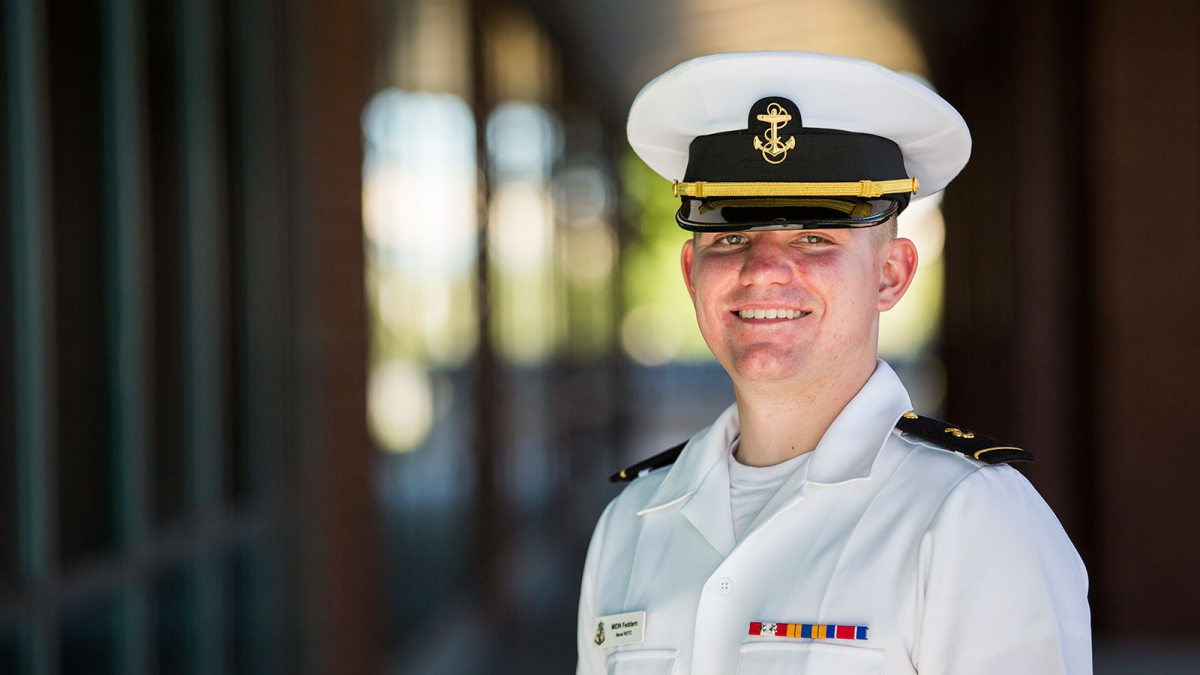Editor’s note: This is part of a series of profiles for spring 2016 commencement. See the rest here.
It’s rare for an entry-level job in a large organization to require a personal interview with the top boss. But when Arizona State University student and Navy ROTC Midshipman James Feddern applied for a position as a Naval Reactors engineer, that’s exactly what he had to do.
Feddern pursued a job in what Lt. Austin Hancock, ASU Navy ROTC nuclear programs officer, describes as the Navy’s most intellectually selective community.
The few applicants meeting the high initial entry requirements are invited to the Navy Yard in Washington, D.C., for interviews. The first two are grueling questioning sessions with the engineering team. Feddern also underwent a third two-hour specialized interview on such esoteric topics as astrophysics.
Those who make it past all the technical interviews then sit down for a one-on-one with the top boss. In this case, Feddern faced Admiral James F. Caldwell Jr., director of the Naval Nuclear Propulsion Program, for final screening. The four-star military officer weighed in.
Feddern made it.
Following his May 9 graduation and his commissioning into the Navy two days later, Feddern will head to his new job as a Naval Reactors engineer at the Navy Yard. Naval Reactors is an agency that researches, designs, regulates and operates nearly 100 nuclear reactors and power plants that drive many U.S. warships, including submarines and aircraft carriers.
“Initially, I will be going through more intensive training and education related to nuclear engineering,” said Phoenix native Feddern. “After that I could be assigned to do a variety of engineering jobs. I am very excited about this assignment. It was my first choice, and I am honored to have been selected to work at Naval Reactors.”
Feddern, a Barrett, the Honors College student who will be receiving his Bachelor's of Science in physics, shares some insights that led him to his current path and some other helpful views for readers.
Question: What was your “aha” moment, when you realized you wanted to study the field you majored in?
Answer: I have a passion for science in general and really enjoyed studying physics in high school. When I started at ASU, though, I was enrolled in the flight program at the Polytechnic Campus. It was only after my first year, though, that I discovered I really had a passion for physics and a desire to learn more about it. Even though I liked learning to fly, I realized that it was something I would like to do as more of a hobby, rather than as a career. So I switched my major. I also thought I could serve the Navy with a degree in physics if I became an officer within the nuclear power community — which includes the opportunity to be an officer at Naval Reactors, a submarine officer, or a surface warfare officer on an aircraft carrier.
Q: What’s something you learned while at ASU — in the classroom or otherwise — that surprised you, that changed your perspective?
A: One of the most important things I learned at ASU is that it’s more important to know what to do when you don’t know the answer to a problem than it is to immediately know the answer. Often it is simply not possible to know the answer to every problem or situation. But it is really important to know how to begin and approach a problem when you have no idea how to do it at first.
Q: Why did you choose ASU?
A: I really wanted to stay in Arizona. It’s definitely my favorite place to live, and it’s close to home. ASU in particular had so many different opportunities and a good flight program. This along with the financial benefits made ASU the best choice. ASU is also my father’s alma mater.
Q: What’s the best piece of advice you’d give to those still in school?
A: The best advice I think I could give is to actively find things you enjoy learning about outside of your field of interest and take classes in that subject, even if they do not relate to your major. For example, I took quite a few classes related to the philosophy of science. I found I really liked to explore and learn about the history and philosophy of science, so much so that I actually completed my senior honors thesis in this area. I definitely recommend that students in Barrett take advantage of senior thesis as an opportunity to expand their knowledge in different fields.
Q: What was your favorite spot on campus, whether for studying, meeting friends or just thinking about life?
A: My favorite spot on campus has to be the upstairs patio at Barrett. This was the best place to study and meet people, especially when the weather was nice.
Q: What are your plans after graduation?
A: Initially, I plan to travel around Arizona a little bit before I leave, try to see some places I haven’t yet. Once I commission into the Navy I will go to work in Washington, D.C., at the Navy Yard.
Q: If someone gave you $40 million to solve one problem on our planet, what would you tackle?
A: I think one significant problem in our society is access to quality education. I would use that money to invest in scholarships for particular people around the world so they can obtain the best education possible. I think getting talented people great education is the key to solving other prevalent problems in society. Education is at the heart of society. Without developing and sustaining it, nothing can be accomplished.
Top photo by Deanna Dent
More Sun Devil community

Tested tips for taking exams
With May quickly approaching, many students are starting to prep for their most important tests of the year — final exams.Toni Miceli, the inaugural director of the bar exam success program at…

School of Transborder Studies celebrates 15th anniversary
During the summer before his freshman year at Arizona State University, Salvador Macias participated in the AGUILA Youth Leadership Institute, a college access organization designed to help young…

Barrett program unlocks study abroad for first-year honors students
Twenty first-year students from Barrett, The Honors College at Arizona State University are spending their second semester studying abroad in Rome, Italy.Traveling in a tight-knit honors community…


